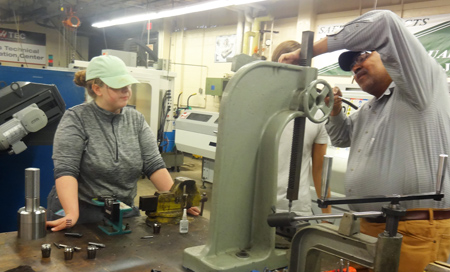
While assembling a student project, Larry Thompson, Western Piedmont Community College Instructor of Computer Integrated Machining Technology, instructs a student on the proper operation of a press.
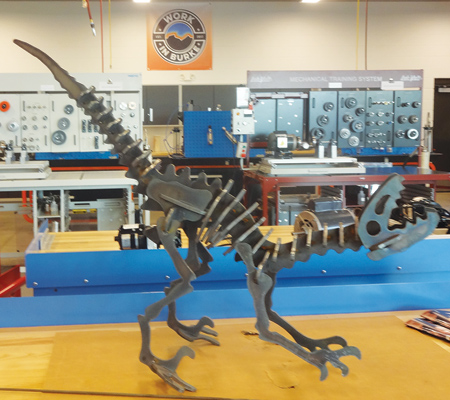
This dinosaur sculpture project is the result of a collaboration between multiple engineering disciplines at Western Piedmont Community College.
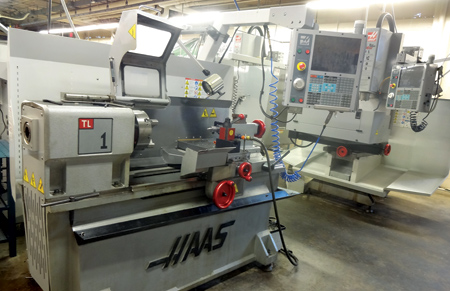
Haas machines on the workshop floor. WPCC is a member of the Haas Technical Education Network.
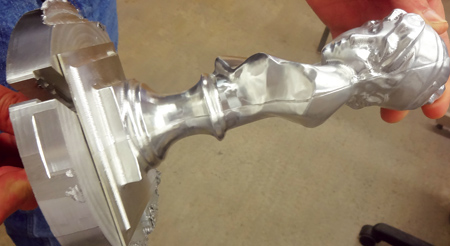
A Western Piedmont CC student machined this aluminum bust on a 5-axis Haas VF-3SS machine.
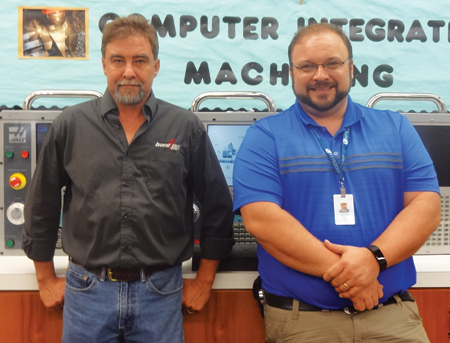
Barefoot CNC President and CEO Jimmy Wakeford and Brandon Hensley, Western Piedmont Community College Department Head of Engineering, work together to instruct WPCC students on the benefits of Mastercam CAD/CAM software.
Nestled in the foothills of Western North Carolina's mountain region, Burke County is known for its thriving tourism industry. But there is more to this picturesque area than mountains, forests and natural lakes. Burke has a diverse economy that is bolstered by furniture, medical, chemical, textile and machine component manufacturing. It includes a considerable concentration of job shops, fixture builders and workholding specialists. At Western Piedmont Community College (Morganton, NC), more than 40 associate degrees are offered to 7,000 students. Other programs include English as a second language, general education and adult high school diploma programs, including degrees in mechanical engineering technology and computer integrated machining technology. Many students in the manufacturing programs are educated and trained to fill available job positions in Burke County.
"In our industry, employers are looking for students who can take a job and run with it," said Brandon Hensley, Western Piedmont Community College Department Head of Engineering. "That means knowing the ins and outs of how the machine works, not just running a machine. Students need to really understand what happens when they put in a line of code."
Many companies require students to build programs at the control rather than rely on a centralized programmer. According to Hensley, WPCC graduates who hold entry level positions would be considered programmers at some companies. Before they are introduced to CNC machines, WPCC students work with manual machines and learn about metallurgy, how tools interact with metal and how specific machining operations are achieved. To keep machines running smoothly, Western Piedmont's facility is outfitted with Mastercam. The CAD/CAM software is updated every two years to keep pace with textbooks. Hensley holds off on teaching Mastercam until the last semester of each school year to ensure that students are well versed in running machines, programming and understanding code.
"On my first day of teaching a Mastercam class, I bring a nice little compilation video of all sorts of machine crashes," said Hensley. "I try to reinforce the idea that the CAM software is another tool for their toolboxes. It is not a miracle that works on everything but, if given the right tools, students can be much more efficient and thorough."
Machining and engineering students use various online programs, including CamInstructor training guides, available in several editions (milling, turning, 4- and 5-axis CNC, wire and solids). Hensley's class has an in-depth understanding of the texts and online materials to ensure that, before beginning any 3-D or multi-axis work, students understand how to create part geometries. For many WPCC graduates, their first jobs in the field will require operating either a 2- or 3-axis CNC machine, so after the first half of the semester, lessons focus on 3-D milling, 3-D machining and dynamic toolpaths. "Western Piedmont students took an instant liking to Dynamic Motion technology. We will just blast chips everywhere and then get awe and amazement out of the students," said Hensley.
Hensley's Mastercam class is a requirement for machining students and an elective for mechanical engineering technology students. For one of their final projects, students create an entire chess set on turning centers. From the king and queen's crowns, to turrets on the rook, to a detailed knight, the intricate pieces are produced by the students on turning centers. "This choice of machine is influenced by the fact that it is difficult to find projects that interest students and require C-axis machining," said Hensley. Milling, on the other hand, is a different story. Day-to-day projects are exciting enough to keep student interest piqued, garnering active class participation on every assignment, including those requiring 5-axis machining.
Ten years ago, the average age for students enrolled in WPCC manufacturing programs was 40 to 50 years of age, mainly men looking to start second careers. Today, the average population is much younger; most participants are in their mid-20s to mid-30s and are seeking their first career positions. Current enrollment in WPCC's machining program is lower than usual due to local plant shutdowns, including Caterpillar, Inc., which closed its Morganton precision engine components manufacturing facility in 2017.
"My program specifically has been recovering from that," said Hensley of the shutdown. "But we have full cooperation with Burke County public schools and Work in Burke, the Burke County development campaign, as well as local industry."
Work in Burke educates students and parents about available job opportunities within the county and the required training for careers in those fields. For WPCC, the biggest advantage of the campaign is that the college can now have a greater reach into high schools. The program enables high school administrations, community college administrations and local industry to present a complete package to incoming and prospective students.
"Now, we are not necessarily just a community college trying to recruit students into our program, we are part of the package that is presented to students to help them land good, high-paying jobs in our area," said Hensley. "That has been the highlight of the Work in Burke partnership."
Over the years, WPCC has had former students return to campus, seeking degrees after plant closings. For example, one former student spent 20 years working in entry level positions in the furniture industry. When he was in his late 40s, he came back to WPCC after the plant he worked in shut down. He enrolled in machining and programming classes and eventually found a new career. After just six months in his new position, he had earned two raises and was making more money than he did after 20 years in his former job.
"We are really concerned with the quality of the machinist that we are putting out," said Hensley. "It is not about showing up for work and making production quotas. I tell my students that if they are just looking for production jobs, they are wasting their time with me. If they want to spend time with me, I will make them supervisors, programmers-something beyond what they could do without me."
In fact, WPCC requires that students show up every day (except when truly ill), on time and ready to learn. There is little tolerance for the student who does not take his or her learning experience seriously. This is part of molding a quality machinist, Hensley pointed out, and a quality employee.
Larry Thompson, WPCC Instructor of Computer Integrated Machining Technology, added that in his machinery class, he tries to teach students the basics, like general machining principles and how to sharpen drill bits and tools. "Hopefully, they carry that knowledge on when they actually run the machines," he said.
In addition to Work for Burke, another source that Hensley, Thompson and their faculty rely on is Barefoot CNC, located nearby in Morganton. The Mastercam Reseller lends support to WPCC whenever called upon. Before he launched his own company, Barefoot CNC President and CEO Jimmy Wakeford worked in furniture manufacturing and was a former CNC machining instructor at WPCC. His background makes him ideally suited for his company's current partnership with WPCC.
"Jimmy works extremely well with all the community college folks," said Hensley. "I can call his team at any point and they will drop everything to help us if we have a serious problem. He is probably the best friend that my program has. I have nothing but positive things to say about working with Jimmy and the boys at Barefoot."
Despite the plant shutdowns in North Carolina, the state is home to many large manufacturing companies, including furniture manufacturers. "There is quite a bit of manufacturing going on, more than you would think," said Wakeford. "All of these companies are looking for employees. In North Carolina, we have 100% job placement for students who want to get jobs, and most of them have jobs before they graduate."
For the past six years, all of the WPCC graduates in the Computer Integrated Machining Technology Program have found jobs in their industries. "The reality is that learning the manufacturing trade does not prevent students from attending big schools, getting big job titles and earning big paychecks," said Hensley. "In fact, it helps them."
"If you are going to attend engineering school, pick up a trade in high school and work yourself through college," he added. "Do not get caught in the trap. But there is still that stigma of `if I do not go to a four-year school, then I am not going to be successful.' We are working extensively with guidance counselors to try to change that."
With the help of CAM software, WPCC will continue to prepare Burke County's next generation of engineers, machinists and CNC programmers.
For more information contact:
CNC Software, Inc.
671 Old Post Road
Tolland, CT 06084
800-228-2877
info@mastercam.com
www.mastercam.com
Western Piedmont Community College
1001 Burkemont Avenue
Morganton, NC 28655
828-448-3500
www.wpcc.edu